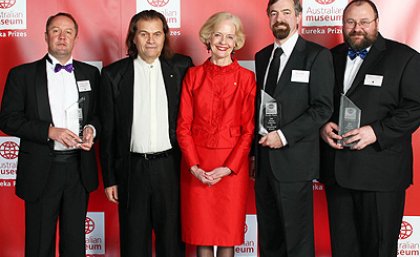
The designers of conservation planning software that helped rezone the Great Barrier Reef have been recognised with the prestigious Sherman Eureka Prize for Environmental Research.
Developed by Dr Ian Ball, Mr Matthew Watts and Professor Hugh Possingham at UQ's Ecology Centre, Marxan is the most widely used conservation planning software program in the world.
It is available free online, and currently used in more than 100 countries worldwide.
“Marxan helps policy makers and managers to design networks of protected areas (reserves), on the land or in the sea, resulting in systematic, transparent, cost-effective and scientifically based environmental outcomes,” Professor Possingham, director of the Ecology Centre, said.
“All the facets of an environmental decision, including commercial and recreation interests, social and cultural requirements, and biological conservation can be included in a conservation decision when using Marxan.”
Further development of Marxan software continues, with support from the Australian Federal Government, and international organisations such as EcoTrust, The Nature Conservancy, and the US National Marine Fisheries Service (NMFS).
Mr Watts said Marxan was currently being used by the Federal Government to develop a marine conservation plan for Commonwealth waters (out to 320 kilometres) off South and Western Australia - from about Adelaide, to Perth, and North into subtropical waters.
“This is just one of several rezonings that will use the software, creating the biggest systematically designed marine reserve system on the planet,” he said.
Mr Jeff Ardron, of the Marine Conservation Biology Institute in Washington DC and member of the IUCN World Commission on Protected Areas, has had a long association with Marxan.
“Ten years ago, I was generously provided with a beta version of Marxan by Dr Ian Ball,” Mr Ardron said.
“That evening, as I studied its documentation and various equations, I knew I had found something totally different, and moreover, directly applicable to what we were doing.
“At the risk of sounding dramatic, it was a moment of revelation.”
Professor Craig Groves, a Director from The Nature Conservancy, one of the largest international non-profit conservation organisations in the world, supported the Marxan Eureka nomination.
“The Nature Conservancy has completed over 120 ecoregional assessments world wide,” he said.
“At least half of these have used Marxan. Nearly every plan underway today uses this valuable tool as well.”
Professor Mark Burgman, director of Australian Centre of Excellence for Risk Analysis, also praised Marxan.
“In my opinion, the research and development encapsulated in the software package Marxan is the most significant contribution to conservation biology to emerge from Australia’s research community,” he said.
The $10,000 Sherman Eureka Prize for Environmental Research highlights outstanding research being undertaken in Australia that addresses critical environmental issues, and the leading role often played by Australian research in identifying solutions to environmental problems and to the improvement of the natural environment, both locally and internationally.
Marxan was not UQ’s only Eureka success story – UQ PhD graduate Dr Conrad Hoskin, who has been involved in the discovery of nine new frog and reptile species, won the Early Career Species Discovery award.
Naming and describing five new species of glow-worm in Australia as well as a new species of wasp that attacks glow-worms in far north Queensland earned PhD graduate Dr Claire Baker a nomination in both the Early Career Species Discovery and People’s Choice categories.
While Dr Baker missed out on a prize, she did score a seat next to Chris Darwin – Charles Darwin’s great, great grandson – at the Eurerka Gala dinner.
“We chewed each others ears off the entire time!” Dr Baker said.
“He is a fascinating man who has a real passion for the natural world and he was also very interested in glow-worms as they are on his property in the Blue Mountains, NSW.”
Dr Baker said she felt “incredibly excited and honoured” to be named a Eureka finalist and had enjoyed the opportunity to promote science research to the general public.
“The categories I was entered in also aim to promote science education, which is the field I have delved into since completing my PhD,” she said.
“The best part was working with the Catalyst tv crew, putting together a story for their show, as well as doing numerous radio and newspaper interviews to promote the event.
“I now run my own consulting business and currently work for six companies promoting aspects of entomology, taxonomy, wildlife tourism and field ecology.”
Media: Professor Possingham (0434 079 061) Penny Robinson at UQ Communications (07 3365 9723, penny.robinson@uq.edu.au)
.jpg)


